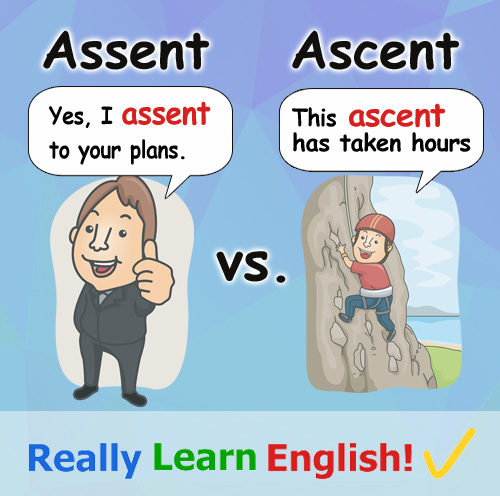Assent vs. Ascent
What is the difference?
It can be hard to remember when to use assent and when to use ascent. Both words sound the same. They are not spelled the same, but the spelling is very similar. There is only one letter that is different. The rest of the letters are the same.
How can you tell the difference between assent and ascent? You do not want to confuse them because they mean different things. Keep reading to learn the difference between assent and ascent.

Let's look at some examples to help you understand the difference.
Click Here for Step-by-Step Rules, Stories and Exercises to Practice All English Tenses
Assent
"Assent" can be a noun or a verb. The noun means agreement with something. It can also mean approval of something. The verb means to agree with something or to approve something.

Examples:
- She assented to the plan to buy the business.
(She agreed with the purchase of a company.)

- He did not assent to her request.
(She asked for something, but he said, "no.")

- My doctor will not assent to mountain climbing because of my ankle problem.
(The doctor said "no" when I asked if it was safe to climb a mountain.)

- I assented to the idea, but now I regret it.
(I agreed to the plan before, but now I changed my mind.)

- A parent's assent is required to go on the class trip.
(Your parent has to agree if you want to go on the trip.)

Ascent
"Ascent" is a noun. It usually means the process of traveling up.

It can also mean a path that goes up.

Sometimes, it can mean making progress.

Examples:
- Our ascent of the mountain will take four hours.
(We are climbing the mountain and we will be at the top in four hours.)

- The ascent is very dangerous.
(The path that goes up is not safe.)

- Her ascent at the company was slow.
(Her path to getting a better job took a long time.)

- His ascent to power was not easy.
(He gained power, but it was difficult.)

- We took the ascent on the left because the one on the right was too muddy.
(We chose the left path instead of the right one.)

Tips
How can you remember when to use ascent and when to use assent? Notice that the only difference in the spelling is the third letter. In ascent, the third letter is a "c." The letter "c" sounds like the English word "see." You can "see" an "ascent" because it is a path. You cannot see an "assent" because it means to agree to something. So the one with the "c" is the one you can "see"!

A Story to Practice Assent vs. Ascent
Mary wishes she did not assent to the hike. The day is already hot, and she is getting very sweaty. But her assent is not something she can take back now that they are half-way up the ascent! At least the flowers are beautiful.
"Come on," her friend Jake says. "If you would assent to walking faster, we could get to the end of the ascent by lunch time."
"Well," she replies. "I wish I could assent to that plan, but this ascent is too steep for me to go any faster! I am afraid that if I tried to do that, I would be assenting to a disaster..."
"I know this is hard," Jake says, "and I'm happy that you assented to climb with me today. I think that once you see the top of the ascent of this mountain, you will be happy that you came. It is amazing!"

Quiz
Answer the following 10 questions and then check your answers. Each question is worth 10 points.
Part 1:
- Which of the following is a correct definition of assent?
- To climb a mountain
- To agree to something
- To say "no" to something
- To manage
- Which of the following is a correct definition of ascent?
- A path that goes up
- A path that goes down
- To agree to something
- To go down
- Which sentence is written correctly?
- The ascent is two miles long.
- Her ascent is needed before we begin the project.
- I walked down the ascent.
- I walked down the assent.
- Which of the following is written incorrectly?
- That path is the best ascent on the mountain.
- I did not assent to her plan.
- I did not ascent to her plan.
- This assent is dangerous because there are snakes on it.
Part 2:
- Please don't _____ if you do not know what you are agreeing to do.
- ascent
- descent
- assent
- assenting
- Her _______ to the plan was hard for me to get.
- assenting
- ascent
- ascented
- assent
- The _____ of the mountain was a great experience.
- assent
- ascent
- assenting
- ascenting
- Don't _____ to buy something you cannot afford.
- ascent
- ascenter
- assents
- assent
- You need _____ from your teacher before you leave the room.
- ascent
- ascents
- assents
- assent
- The ______ away from this valley is five miles long.
- ascent
- ascents
- assents
- assent
Answer Key
Part 1: 1. B | 2. A | 3. A | 4. C
Part 2: 1. C | 2.D | 3.B | 4.D | 5.D | 6. AGet Updates, Special Offers, and English Resources
Download your FREE GIFT (the first two chapters of
English Short Stories Book and Workbook)
as soon as you join!

By submitting your email, you consent to receiving updates and newsletters from us and to the sharing of your personal data with third parties for the purposes of sending you communications. We will not spam you. You can unsubscribe at any time. For more information, please see our privacy policy.
Return from Assent vs. Ascent to Confusing Words and Some Common Mistakes in English





